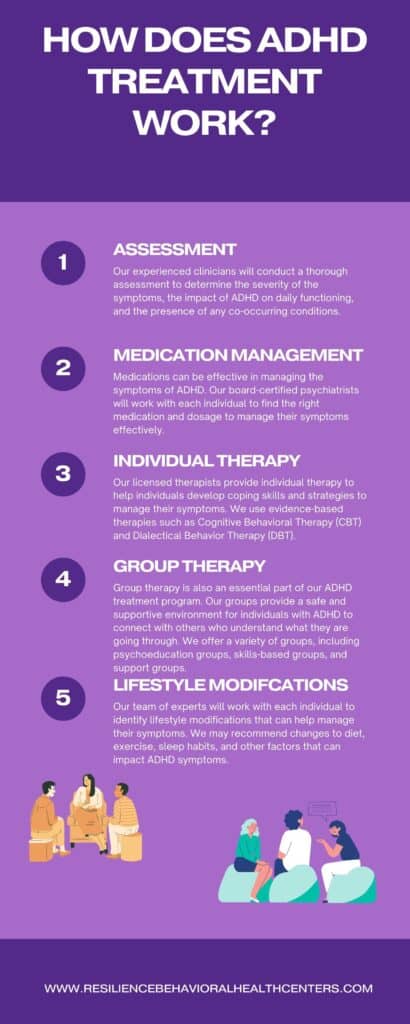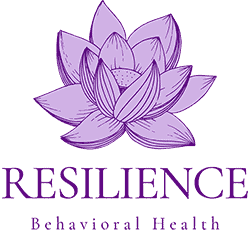Treatment for ADHD in Boston, MA
ADHD, or Attention Deficit Hyperactivity Disorder, is a neurodevelopmental disorder that affects millions of people around the world. ADHD can cause difficulties with attention, hyperactivity, and impulsivity, and it can interfere with academic, social, and occupational functioning. Fortunately, ADHD is treatable, and Resilience Behavioral Health Centers offers effective ADHD Treatment Boston and evidence-based treatment for individuals with ADHD.
What is ADHD Treatment?
ADHD is typically diagnosed in childhood, but it can also be diagnosed in adolescence or adulthood. Individuals who exhibit symptoms of inattention, hyperactivity, or impulsivity that interfere with their daily functioning may qualify for ADHD treatment. To be diagnosed with ADHD, an individual must meet specific criteria outlined in the DSM-5.

What are the Symptoms of Adult ADHD?
The symptoms of adult ADHD, or Attention Deficit Hyperactivity Disorder, can vary from person to person. However, some common symptoms of adult ADHD may include:
Inattention: Difficulty focusing on tasks, forgetfulness, losing track of details, and disorganization are common signs of inattention in adults with ADHD.
Hyperactivity: Restlessness, fidgeting, and difficulty sitting still are common signs of hyperactivity in adults with ADHD.
Impulsivity: Acting without thinking, interrupting others, and difficulty waiting for one’s turn are common signs of impulsivity in adults with ADHD.
Poor Time Management: Difficulty with time management, procrastination, and underestimating the time it takes to complete tasks are common signs of ADHD in adults.
Emotional Instability: Emotional outbursts, mood swings, and difficulty regulating emotions are also common symptoms of ADHD in adults.
Relationship Difficulties: Difficulty with communication, forgetfulness, and impulsivity can cause difficulties in personal and professional relationships for adults with ADHD.
It’s important to note that these symptoms can be present in individuals without ADHD, and a proper diagnosis should be made by a qualified healthcare professional. If you are experiencing any of these symptoms, it’s important to seek the help of a mental health professional who specializes in ADHD.
How Does ADHD Treatment Work?

At Resilience Behavioral Health Centers, we take a comprehensive approach to ADHD treatment. Our treatment program involves the following steps:
Assessment: Our experienced clinicians will conduct a thorough assessment to determine the severity of the symptoms, the impact of ADHD on daily functioning, and the presence of any co-occurring conditions.
Medication Management: Medications can be effective in managing the symptoms of ADHD. Our board-certified psychiatrists will work with each individual to find the right medication and dosage to manage their symptoms effectively.
Individual Therapy: Our licensed therapists provide individual therapy to help individuals develop coping skills and strategies to manage their symptoms. We use evidence-based therapies such as Cognitive Behavioral Therapy (CBT) and Dialectical Behavior Therapy (DBT).
Group Therapy: Group therapy is also an essential part of our ADHD treatment program. Our groups provide a safe and supportive environment for individuals with ADHD to connect with others who understand what they are going through. We offer a variety of groups, including psychoeducation groups, skills-based groups, and support groups.
Lifestyle Modifications: Our team of experts will work with each individual to identify lifestyle modifications that can help manage their symptoms. We may recommend changes to diet, exercise, sleep habits, and other factors that can impact ADHD symptoms.
What is the Best Treatment for ADHD?
The best treatment for ADHD is a combination of medication and psychotherapy. Medications can help manage the symptoms of ADHD, while psychotherapy can help individuals develop coping skills and strategies to manage their symptoms effectively. Lifestyle modifications can also be beneficial for individuals with ADHD.
What are Three Ways to Treat ADHD?
-
Medication: Stimulant medications such as Adderall and Ritalin are commonly used to manage the symptoms of ADHD.
-
Psychotherapy: Evidence-based therapies such as Cognitive Behavioral Therapy (CBT) and Dialectical Behavior Therapy (DBT) can help individuals develop coping skills and strategies to manage their symptoms effectively.
-
Lifestyle Modifications: Improving sleep habits, exercise, and diet can also be beneficial for individuals with ADHD.
Can People with ADHD Lead a Normal Life?
Yes, people with ADHD can lead a normal life with proper treatment and management of their symptoms. ADHD is a manageable condition, and with the right treatment, individuals with ADHD can achieve academic, social, and occupational success.
Is ADHD Treatment Covered by Health Insurance?
Yes, in the United States, dual diagnosis treatment is typically covered by insurance, including private insurance. Medicaid, and Medicare are also covering this treatment. Under the Affordable Care Act (ACA), insurance plans are required to cover mental health and substance abuse treatment. They must cover the same level as other medical services. This means that individuals with co-occurring disorders have the right to access affordable, comprehensive care.
The level of coverage for dual diagnosis treatment may vary depending on the specific insurance plan. Most plans cover a range of services, including inpatient and outpatient treatment, medication management, and therapy. How to determine your insurance coverage for dual diagnosis treatment? It’s important to contact your insurance provider directly. You can work with the treatment program’s staff to verify your insurance benefits and coverage.
It’s important to note that while insurance can help cover the cost of dual diagnosis treatment, there may still be out-of-pocket costs. This includes copays or deductibles. Some treatment programs may also offer financial assistance. Sliding scale fees for individuals who cannot afford to pay the full cost of treatment are available.
For a completely confidential, free, and expert consultation give Resilience Behavioral Health a call today at (888)-401-1179 and speak with a treatment placement specialist.


